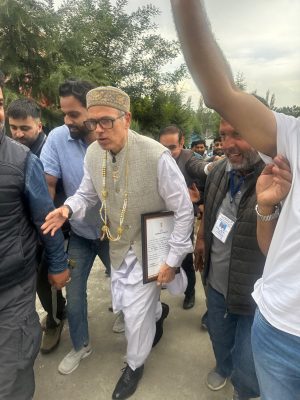Prime Minister Narendra Modi’s Bharatiya Janata Party (BJP) faced an electoral setback in the troubled Himalayan region of Jammu and Kashmir (J&K), as components of the opposition alliance, the INDIA bloc, gained the majority in the recent elections to the J&K assembly.
This is the first provincial election in J&K in a decade and in the five years since the Modi government revoked the autonomy of the state of J&K and divided and downgraded it into two federally-controlled union territories (UTs) – the UT of J&K with a legislature and the UT of Ladakh without a legislature.
While most exit polls predicted a hung assembly, INDIA bloc partners the National Conference (NC) and the Congress won 48 seats. In the 90-seat legislature, 46 is the majority mark.
“The mandate is clear. People voted against the central government and its policies,” said Muhammad Yusuf Tarigami, a senior leader of the Communist Party of India (Marxist), a component of the INDIA bloc. Tarigami was elected from Kulgam constituency for the fifth consecutive term; he has been representing Kulgam since 1998.
The BJP, however, had a major relief on Tuesday, as they returned to power in the Haryana state of north India with a clear mandate. The results of J&K and Haryana were declared on the same day.
The 2024 parliamentary election pointed to the BJP’s waning popularity in Haryana, which the party has been ruling since 2014. The BJP lost half of Haryana’s parliamentary constituencies. But the assembly election results reveal India’s main opposition party, the Congress, has a lot more work to do to recover its strength in northern India.
In Kashmir, many political observers had expected the Hindu nationalist BJP to sweep the Hindu-majority Jammu plains, while the Muslim-majority Kashmir valley was expected to return a split verdict. This was because the parliamentary elections held in April-May 2024 saw hints of divided public opinion in the Kashmir valley, which has remained a hotbed of separatist insurgency for a major part since the late 1980s.
In the parliamentary elections, the BJP won both of Jammu’s parliamentary constituencies. In the Kashmir Valley, while the NC-led INDIA bloc won two seats, NC leader and former Chief Minister Omar Abdullah was dealt a shock defeat by Abdul Rashid Sheikh, better known as “Engineer Rashid,” a politician facing terror-funding charges who contested while being lodged in jail. Rashid’s victory without much electoral campaign was seen as a blow to mainstream political parties in the Baramulla region.
Closer to the J&K assembly election, the banned Jamaat-e-Islami (JeI), often considered the ideological fountainhead of Kashmiri separatism, decided to contest through independent candidates. Since the controversial 1987 election, the JeI has always called for boycotting the polls. It was banned in 2019.
While Rashid’s party, the Awami Ittehad Party (AIP), fielded 35 candidates, the JeI backed 10 independents. Many of these candidates were former separatist leaders of various levels. These parties were expected to spoil the INDIA bloc’s chances in the Kashmir valley.
The results reveal they failed to capture the popular imagination. Of the 35 candidates from Rashid’s party, only his brother won, and few managed to put up any contest. Of the 10 independents backed by the JeI, none won and most received a negligible vote share.
“This is a triumph of mainstream Kashmiri politics over separatism, even if a temporary one. The mandate in the predominantly Muslim assembly constituencies was clearly in favor of the mainstream parties – the NC, the Congress, and the People’s Democratic Party (PDP),” a Srinagar-based journalist told The Diplomat.
On the eve of the election results, Rashid urged all parties that come what may, they should not form a government until the federal government restored statehood. Rashid is currently out on interim bail.
His stance would have led to a constitutional crisis had Rashid’s AIP and JeI’s independents won a significant number of seats. But a clear verdict in favor of mainstream parties like the NC and Congress has almost ensured Omar Abdullah’s return to the chief minister’s chair.
Former Chief Minister Mehbooba Mufti’s party could not recover from its parliamentary election debacle. Political observers in Kashmir feel she is paying the price for joining hands with the BJP to form the government in 2014. Thanks to the alliance with the PDP in 2014, the BJP was able to be part of the government in Kashmir for the first time. The BJP-PDP alliance government broke down in 2018 and since then the federal government has administered J&K.
Despite literally taking control of Kashmir – a region the BJP never electorally won – the BJP failed to make any further electoral inroads. Even in the Hindu-majority Jammu region, their performance has not improved.
In 2014, of the 37 assembly seats in the Hindu-majority Jammu region, the BJP had won 25 (67.5 percent). This time, of the 43 seats in the Jammu region in the reconstructed legislative assembly, the BJP won 29 (67.5 percent).
The Kashmir valley-based parties perceived to be close to the BJP – for example, the Sajad Gani Lone-led People’s Conference and Altaf Bukhari-led Apni Party – failed to impress voters. Lone is the only winner from his party and Bukhari himself lost.

































